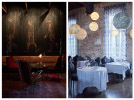|
|
|
| ITALICA NEWS |
|
|
 Colours and flavours in the heart of Cape Town: Luke Dale Roberts’ experimental cuisine
Colours and flavours in the heart of Cape Town: Luke Dale Roberts’ experimental cuisine |
|
[ Italica ] Heading to Cape Town, Table Mountain is the first thing you’ll see. One of the most iconic landmarks of South Africa, this thousand-meter high flat-topped mountain owes its name to the peculiar shape of its top, flat, like a table, and is often wrapped in a thick blanket of clouds, the tablecloth, as the Capetonians call it. With its landscape of woods, vineyards, botanical gardens within a 4-million-inhabitant city, the Table Mountain nature reserve extends to the Cape of Good Hope, where the Atlantic and the Indian oceans meet and clash.
Turning to the West, the Twelve Apostles mountain range towers above a breath-taking view on the Atlantic Ocean.
But the beating heart of Cape Town is to the north: the historic centre, and the port, with its docks and its ships. In the XVII century, from this area, the first shipments left to the east, and what was once only a port for the Dutch East India Company became a large urban settlement later known as Cape Colony, later conquered by Britain. It is from the balcony of the Town Hall that Nelson Mandela made his first speech as a free man, thus starting a new era for South Africa.
Cape Town, the legislative capital of South Africa, is not a city like any other: contradictions have always characterised its history and their traces are still evident, but the strong and proud identity led Cape Town, once considered a dangerous city, to become one of the most beautiful and visited cities in Africa. A unique melting pot of cultures and traditions, where you can find Dutch- and Victorian-style architecture, alongside the enchanting Constantia wine estates, and the numerous minarets built up by the Muslim community since the nineteenth century.
But Cape Town is a city in constant change: the redevelopment and restructuring of several areas has given a new face to the city: an example of this new trend is given by the Old Biscuit Mill, an old biscuit factory transformed into a small and elegant court with various shops and one of the most renown restaurants in South Africa, The Test Kitchen.
Luke Dale Roberts’ The Test Kitchen is a typical example of post-industrial design, with modern steel and wood furnishings next to old bare bricks walls and exposed pipes.
Seated at a The Test Kitchen’s table,
Dale Roberts explains that he had been working in Europe, Asia and Latin America before settling down in Cape Town in 2006: ‘I worked for almost five years in one of the best-known restaurants in Cape Town, but I felt the need for a space, where I could experiment my ideas’.
And it is precisely from Dale Roberts’ desire to experiment that came the name of his restaurant, The Test Kitchen, and it is here that he creates his world-renown dishes, microcosms of flavours and colours with daring combination.
‘I like my food to have a great taste and to be beautifully presented, but, above all, I care about the quality: I prefer local products, I personally know the people who grow the vegetables I use, those who catch the fish I cook’ – Dale Roberts tells me.
Everything happens before the guests’ eyes - the restaurant has an open kitchen – ‘I like the idea that people who come to my restaurant feel involved in the preparation of the dishes’ - says the half-English and half-Swiss chef.
Luke Dale Roberts opened his restaurant in 2010, and, since then, it has been recognised as South Africa’s best restaurant. In 2017, The Test Kitchen was named the ‘Restaurant of the Year’ at the Eat Out Mercedes-Benz Restaurant Awards, and placed 45th at the Elite Traveler Top 100 Restaurants in the World.
The Test Kitchen is at The Old Biscuit Mill, 375 Albert Road (Cape Town - South Africa). [Italica – S. Delmedico ]
|
|
|
|
|

